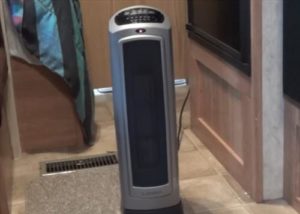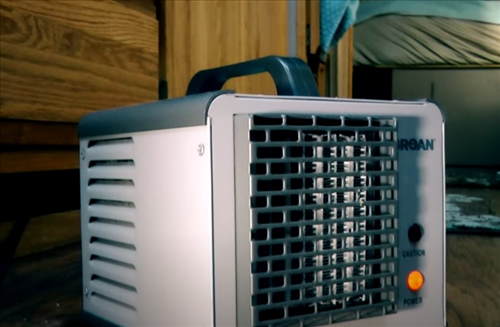
Heating a recreational vehicle very much depends on the source of power you have available.
For example, an RV hooked up to a good electric source can easily use electric heating units.
Of course, while camping away from a good electric power source, propane is a good option.
Each heating source has its pros and cons, with every scenario different often; a combination of the different types is often best but will vary.
Can I Use an Electric Heater in an RV?
Yes, electric heaters can be used in an RV.
Electric units are great as long as there is a power hookup. Keep in mind also how much power can be pulled from a source since electric heaters can pull a lot of power and possibly trip a breaker.

For example, a standard home AC power outlet has a 15-20 Amp breaker. A standard electric heater uses between 800-1500 Watts which needs a 20 Amp beaker to run safely. Any more electric devices running from the outlet will trip the breaker.
This will not be an issue if you have a good power source, such as hookups at many camping sites or camping parks.
For those who have a less-than-desirable AC power source, propane is likely a better option.
What is a Good Electric Unit for an RV?
Most electric units can be used in an RV, even low-cost units.
The unit should be safe to use with features such as overheat protection that shuts the unit down if the surrounding area becomes too hot and instant shut-off tip-over protection.
*This site contains affiliate paid links for which a commission earned.
Our Picks for Best Electric Heaters for an RV
- Portable Ceramic Space Heater
- Oil Filled Radiator Heater
A portable ceramic space heater is an option most everyone is familiar with and a go-to choice for many.
They are good basic units as long as a good electric power source is available.
A good unit for an RV or trailer will have tip-over protection and overheat protection.
Electric oil filled radiator units are also very popular and work very well.
They don’t give out a huge amount of heat but radiate a steady pace which helps regulate heat in a space.
They also have many safety features which makes them ideal in many scenarios.
Alternative To Electric Heating in an RV
Using propane is a good option when away from an electric source or as emergency heating.
A good propane heater is hard to beat since it can put out some good heat anywhere.
The only real problem with propane is having to lug around and refill tanks constantly, which can become a pain time.
With that said, propane is the best, in my opinion heating an RV, especially on a very cold night. Many RVs will have a built-in propane heater.
There are also many small portable propane heaters that come in all shapes and sizes.
My favorite is Mr. Buddy, which has a low oxygen shut-off and works very well.
Mr. Heater F232000 MH9BX Buddy on Amazon
Mr. Heater F232000 MH9BX Buddy 4,000-9,000-BTU Indoor-Safe Portable Propane Radiant Heater
If a small portable propane unit is used, be aware they use a lot of oxygen in a small space and put out carbon monoxide, which can be dangerous.
Leaving a window or door cracked open is a must when such a unit.
It has an automatic shut-off if the Carbon monoxide levels become too high.
Carbon monoxide decors should be installed for safety with many fire alarms having them built-in.
Summary
Both propane and electricity are good options for heating an RV or trailer.
There are many units available, with those above simply being some of my favorite options.
Any unit bought should have some basic safety features built-in to give protection.
If you have a favorite good unit, let me know in the comments below.